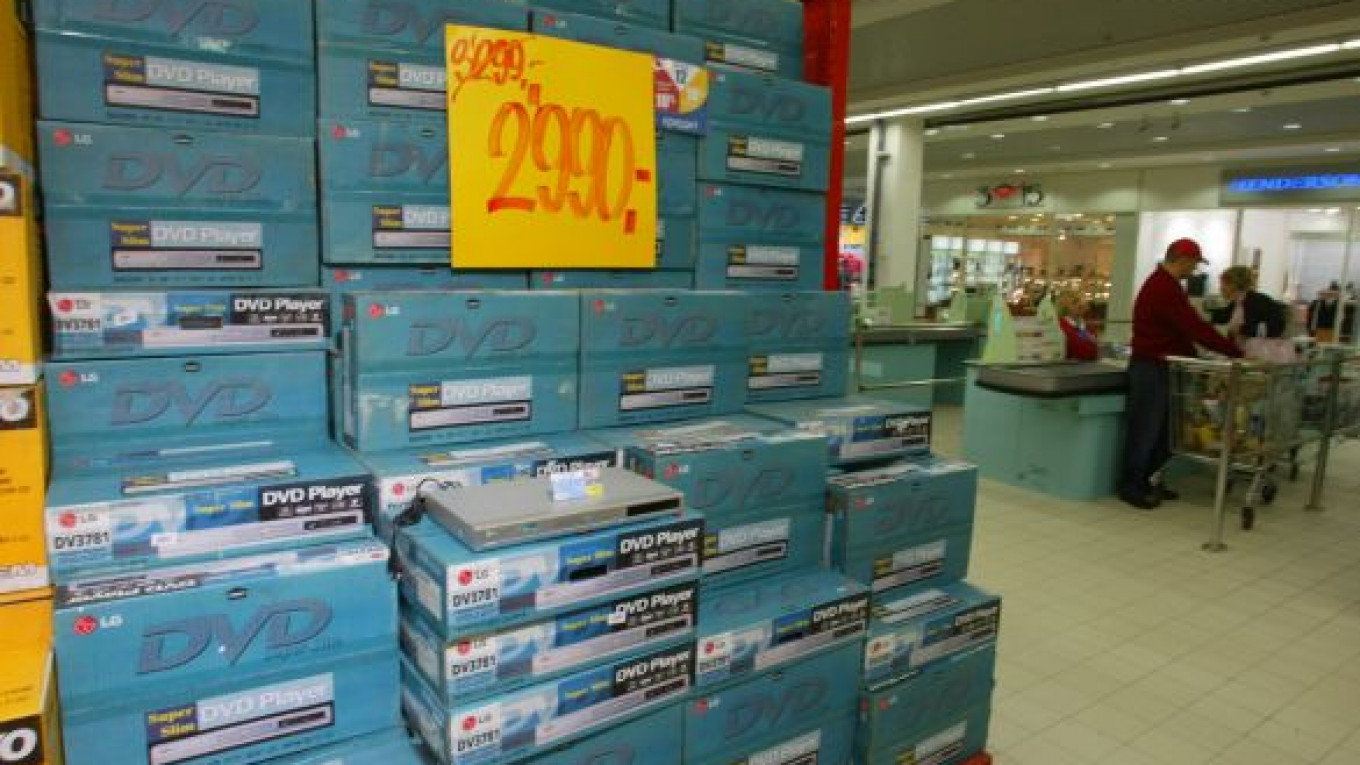Manufacturers and local distributors of electronic goods sent a letter to the government on Wednesday proposing to reduce the list of appliances for which they pay 1 percent of the customs value to compensate copyright holders.
Among the devices they propose to exclude from the 63-item list are cameras, DVD players, radios, projectors and all telephones except for cell phones with memory of more than 1 gigabyte, said Alexander Onishchuk, president of the Association of Trading Companies and Manufacturers of Consumer Electronic and Computer Equipment, or RATEK.
"There are a huge number of devices on the list approved by the government. But can you imagine a situation when someone uses a voice recorder to copy a piece of music or a film? To say nothing of a radio," he told a news conference on Wednesday.
"We ask to eliminate the absurd. It's impossible to impose a fee on anything with a record button," Onishchuk said.
The Federal Service for the Protection of Cultural Heritage authorized the Russian Union of Rights Holders late last year to collect a fee of 1 percent of the customs value of imported electronic devices and blank recordable media.
The union, which is headed by film director Nikita Mikhalkov, did not respond to a request for comment on Wednesday. Onishchuk said that even if the proposal goes though, the total sum to be collected is unlikely to decrease significantly because the share of the appliances to be excluded is meager in comparison with the overall electronics market.
Cameras, for example, account for just 4 percent of this market, according to GFK, a market research company.
The size of the electronic goods market in the second quarter of this year reached 270 billion rubles ($9 billion), the company said.
The request to reduce the list of devices for which the levy must be paid was made after a survey showed that people use just a handful of such devices to copy data for their personal use, Onishchuk said.
Only 30 percent of Russians aged 18 and over copy films and music for personal use, of which 24 percent use a desktop computer, according to a RATEK-commissioned survey by the state-run VTsIOM pollster.
Among other devices most frequently used to copy such data are cell phones and laptops, with 15 percent and 9 percent of users, respectively.
VTsIOM interviewed 1,600 residents of 138 cities across Russia. The margin of error was 3.4 percent.
The players of the electronic devices market will benefit from reducing the list of taxable appliances because they'll be able to save money, which could be used to develop new products, Onishchuk said.
"It will have a favorable effect on the companies' business. … One percent of the customs value isn't a huge sum, but it's significant," he said.
A Message from The Moscow Times:
Dear readers,
We are facing unprecedented challenges. Russia's Prosecutor General's Office has designated The Moscow Times as an "undesirable" organization, criminalizing our work and putting our staff at risk of prosecution. This follows our earlier unjust labeling as a "foreign agent."
These actions are direct attempts to silence independent journalism in Russia. The authorities claim our work "discredits the decisions of the Russian leadership." We see things differently: we strive to provide accurate, unbiased reporting on Russia.
We, the journalists of The Moscow Times, refuse to be silenced. But to continue our work, we need your help.
Your support, no matter how small, makes a world of difference. If you can, please support us monthly starting from just $2. It's quick to set up, and every contribution makes a significant impact.
By supporting The Moscow Times, you're defending open, independent journalism in the face of repression. Thank you for standing with us.
Remind me later.






